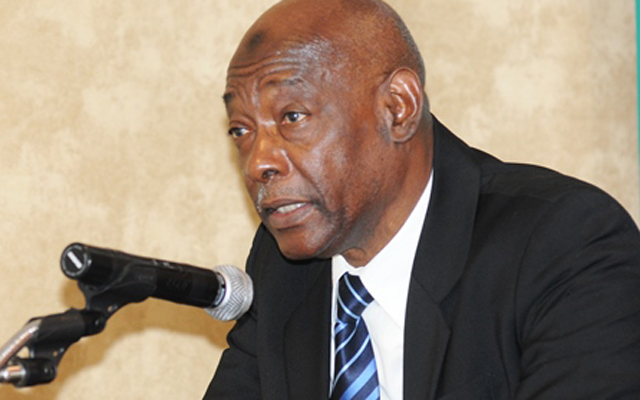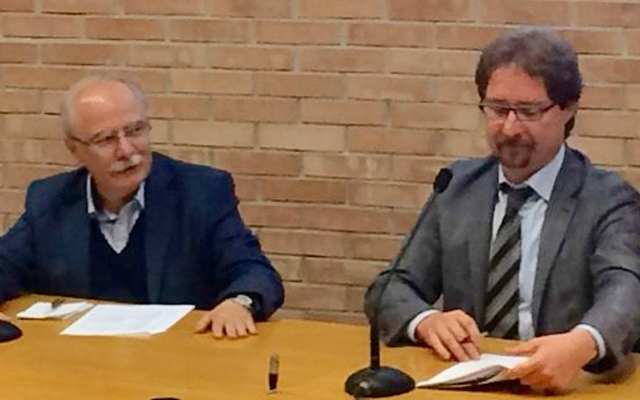Most of the wars in human history have originated over the issues of food, land and water. This is why, in the words of Senegalese soil expert Moctar Toure, peace-building programmes should consider the role and the importance of securing food as a way to reinforce stability and, ultimately, decent life.
Toure, a 1985 TWAS fellow and currently a TWAS vice president, was a guest speaker at an event called "Emptying arsenals, building peace". The conference was organized at Città della Scienza, in Naples, to draw the attention of thinkers, philosophers, policy advisors and journalists to the importance of strengthening peace-building and peace-keeping initiatives.
More than 20 distinguished speakers were in the audience: Paolo Cotta-Ramusino, Secretary General of the Pugwash Conferences on Science and World Affairs; Luigi Mascilli Migliorini, an Italian historian from Università Orientale di Napoli and a member of the Italian Accademia dei Lincei; philosopher Telmo Pievani from Fondazione Umberto Veronesi, among others. Participants also included a delegation of high-school students from Orvieto, in the Italian province of Umbria.
The event was organized by Pietro Greco, an Italian science journalist. The purpose, he explained, was to gather groups and organizations that deal with peace and science, with the aim of networking and taking official actions to help spread peace in the world.
"We must work on war-prevention," warned physicist Francesco Lenci from the Italian National Research Council, a professor of Science for Peace at Pisa University in Italy. By conveying attention to the catastrophic threat posed to humanity by nuclear and other weapons of mass destruction, the Pugwash Conferences on Science and World Affairs have set in motion important efforts to promote dialogue among conflicting parties, Lenci recalled. But the world has dramatically changed during the last decades.
During the Cold War, emphasis was given to a balance of nuclear weaponry. The common thinking was that endowing a few superpowers with nuclear weapons would lead to global stability, Cotta-Ramusino recalled. Cotta-Ramusino, a professor of mathematical physics at the University of Milan (Italy) and the co-founder of the Italian Union of Scientists for Disarmament (USPID), in 1983, is also the secretary of the Pugwash Conferences, which were awarded the Nobel Peace Prize in 1995.
And he added: "Now many nations could, in principle, open hostilities. Today different countries have the potential to start a global war, and major risk stems from the ability of many to react with prompt response, as well as from the spread of extreme ideologies easy to imitate."
Conflicts, as Pietro Greco observed, arise from the weakening of international stability and from social inequity. And food plays a prominent part in this scenario. As Toure noted, food insecurity goes beyond agricultural production and productivity: it can be both a cause and a consequence of global violence.
A native of Senegal, Toure has served as the World Bank's lead specialist for agricultural services in the Africa Region and team leader for the sustainable land management programme. He has also led a team on land and water resources at the Global Environment Facility (GEF), and is a founding member of the African Academy of Sciences.
"Without peace, ending poverty and hunger will never be achieved," he maintained. But he stressed the complexity of hunger, and of peace: climate change and natural disasters drive food price fluctuations and, ultimately trigger an array of responses that can culminate in violence, from food riots to revolution. He cited Somalia, the Central African Republic, Sudan and South Sudan as cases in point. Despite a slight decrease in wars during recent decades, the number of armed and violent conflicts worldwide has increased, and today about 1.5 billion people live in conflict-affected nations. Inevitably, they try to escape from these nations.
"The capacity to house migrants cannot exist in nations and societies where the development rate is low. Such countries may fuel racism. Instead, we need to build the 'acceptance culture'," said Migliorini. Racism and the lack of consideration for the intrinsic value of human beings was the focus of Fernando Chica Cepeda's speech. Cepeda is a Colombian lawyer and an environmentalist who works addressing environmental and social problems affecting the Colombian forest.
"The Colombian government says that in the Colombian forest there is no human life ... apart from the Indians," he told the audience. "But these people are indeed human beings!" Then Cepeda offered an example of how peoples' traditions and needs are taken in little consideration in Colombia. To easily obtain land from natives, the government lures these people with a generic idea of progress, but then it expropriates their fields using physical and psychological violence.
Conflict-affected regions are highly vulnerable, explained Toure. They are places where acute hunger develops. Infrastructures are destroyed, markets are disrupted and this further marginalizes social groups that are already weak.
"So, why is food an important security and stability issue?" he asked. Because about 60 million people who are displaced by conflicts increase instability, by crossing borders and creating ethnic tension.
Telmo Pievani, the Italian philosopher, focused on the role of science as a universal language. "Science", he said, "has a chance to imagine innovative solutions to fighting wars and conflicts. Science can be a tool for peace, especially if we consider that war is note wired in our brain, it is not a biological need but a social invention: the same species that has invented war, may invent peace."
And there are indeed some lessons that we have learned from the past, which have an impact on food security and the future, added Touré. Sub-Saharan Africa has suffered from violent conflicts in the last 20 years. Throughout this area community-driven development projects have been applied, which have achieved some results: they have implemented some food chains (rice, horticulture and the breeding of small ruminants such as sheeps and goats and have increased access to a few basic services. However, they have failed to benefit the poor because they have put little focus on education and training for rural communities, for women in particular, and on sharing scientific knowledge.
That's where science comes in. "The scientific community has the power to harness and scale up existing technologies," said Toure. "It has also the ability to analyze conflict dynamics and gain better understanding of social, political and economic factors that trigger a crisis and how this shapes food availability, agricultural resilience and crop diversification."
Governments, for their part, should prioritize agriculture by promoting reforms aimed at increasing food availability. At the same time they should protect vulnerable farmers with tailor-made policies and help displaced populations by applying more flexible trade regulations. Active citizenship should play a more prominent role, urged Pietro Greco, because on many issues, citizens can effectively put pressure on governments.
And Toure concluded: "The international community should develop and adhere to a consensual code of conduct based on the creation of regional stockpiles, resources and logistics that ease food access, and on financial mechanisms that allow long-term financial arrangements." Recurrent conflicts pose a serious threat to humanity by impacting on food production and access. The international community is now called to act as a unified body, shaping the future through peace-building processes supported by science and technology.
Today the world, said Toure, has enough food, logistics and knowledge to end food insecurity and hunger, and thus to prevent or stop conflicts. "Achieving this goal," he added, "is only a matter of political will."
Cristina Serra

